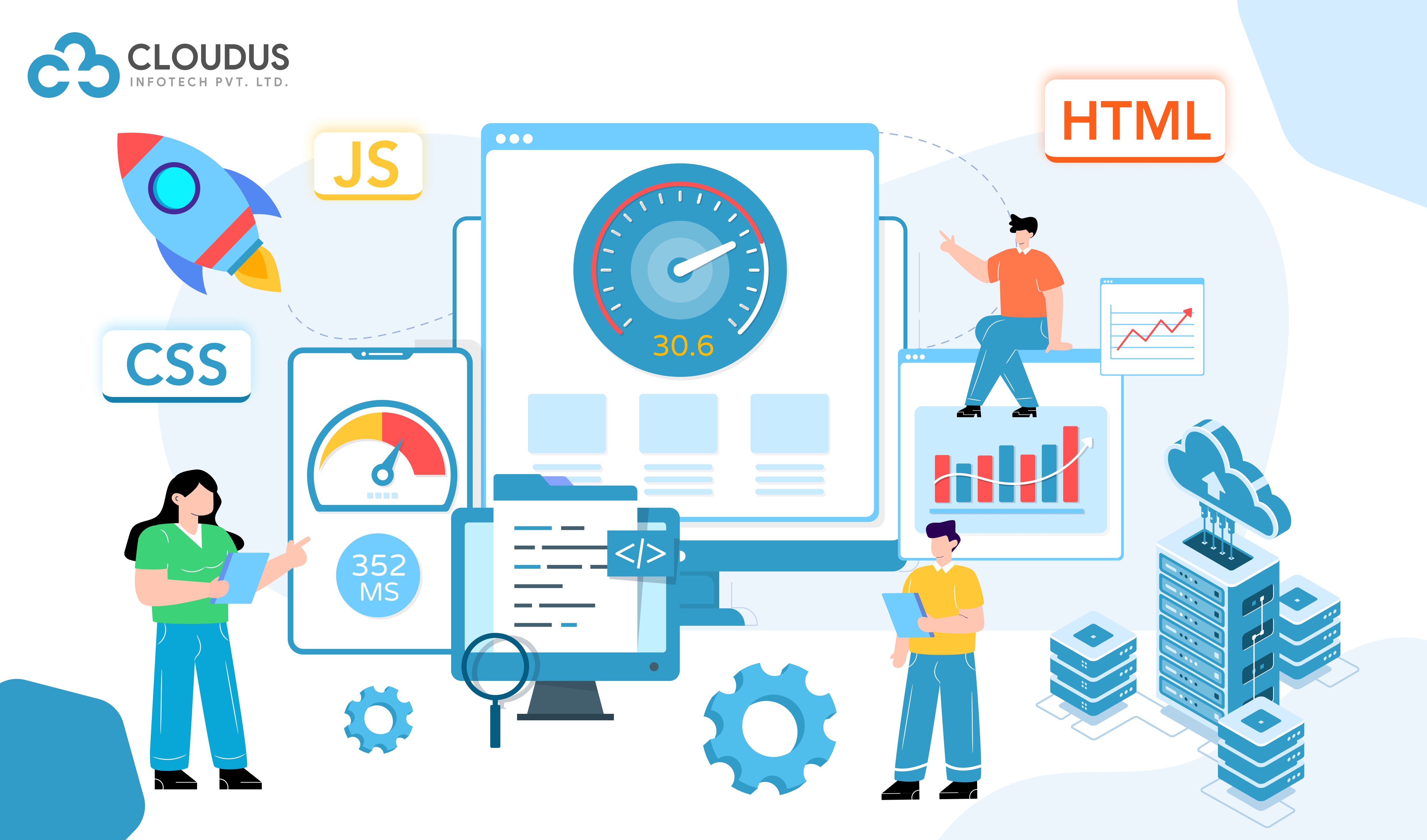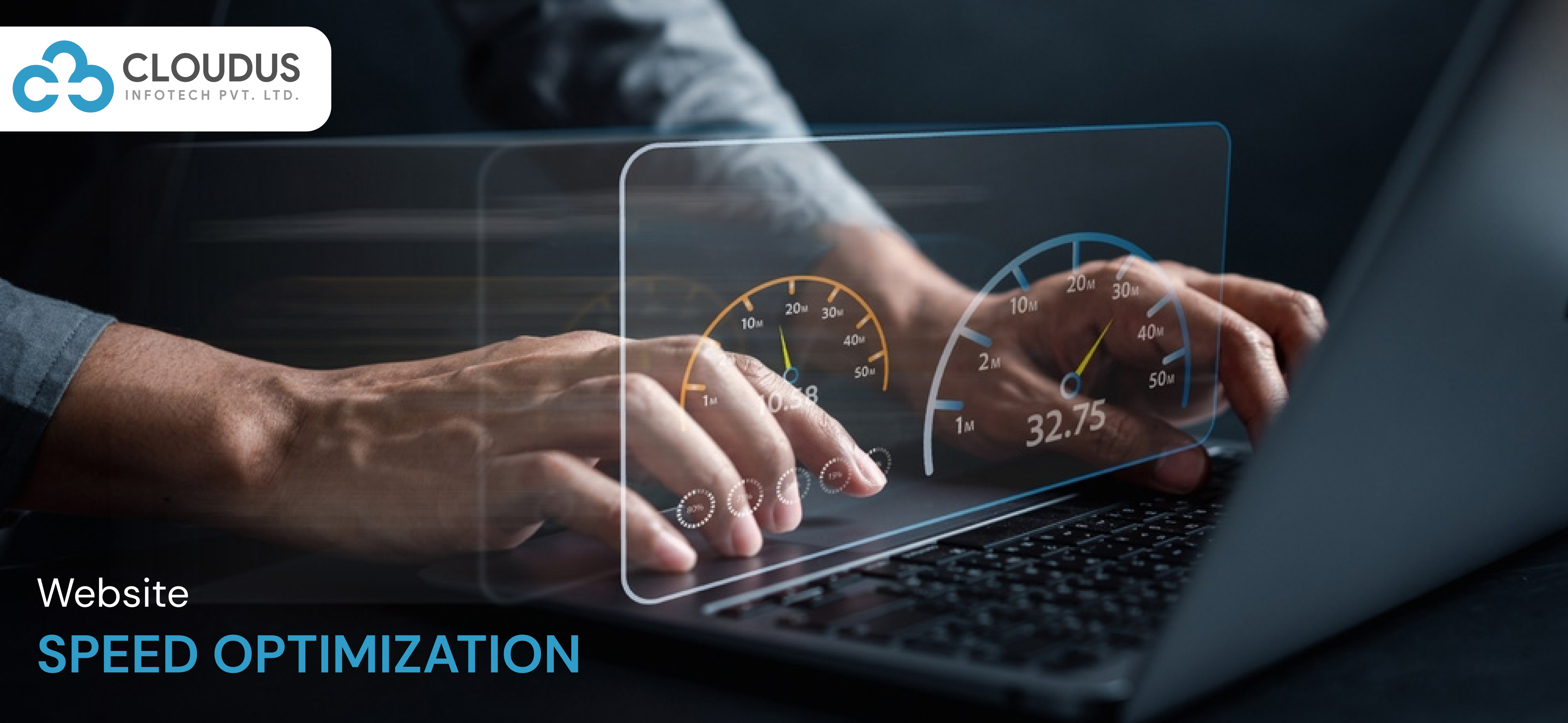
Posted by: Cloudus Infotech Pvt. Ltd.
Table Of Contents
1. Introduction
2. Understanding Website Speed Optimization
3. Techniques for Website Speed Optimization
- 3.1 Optimizing images
- 3.2 Enabling caching
- 3.3 Minimizing HTTP requests
- 3.4 Minifying CSS and JavaScript:
- 3.5 Using a content delivery network (CDN)
- 3.6 Optimizing code and scripts
4. Tips for Website Speed Optimization
- 4.1. Compress and optimize images
- 4.2 Use a fast and reliable web hosting service
- 4.3 Use a responsive web design
- 4.4 Minimize the use of third-party scripts
- 4.5 Keep your website updated
5. Conclusion
Introduction
Website speed optimization is the process of making your website load faster, resulting in a better user experience for your website visitors. This can have a significant impact on your website's success, as website speed is one of the main factors affecting user engagement, conversion rates, and search engine rankings. In this article, we'll explore the importance of website speed for online businesses, the factors that impact the website speed, and the various techniques and tips that can help you optimize your website speed for maximum performance.
1. Explanation of website speed optimization:
Website speed optimization refers to the process of improving the load time of your website so that it loads faster and more efficiently for your website visitors. This involves optimizing various elements of your website, such as images, scripts, and code, to reduce the amount of time it takes for your website to load. The goal of website speed optimization is to provide a better user experience for your website visitors, which can ultimately lead to higher engagement, better conversion rates, and improved search engine rankings.
2. Importance of website speed for online businesses:
Website speed is a critical factor in the success of any online business. Slow website speed can result in frustrated website visitors, leading to higher bounce rates and lower engagement. This can have a direct impact on your website's conversion rates, as visitors are less likely to make a purchase or sign up for a service if they have a poor user experience. In addition, search engines such as Google place a high priority on website speed when ranking websites in search results. This means that a slow website can result in lower search engine rankings, reducing your website's visibility and traffic.
Understanding Website Speed Optimization:
1. Factors that impact the website speed:
Several factors can impact the website speed, including the size of the web page, the number of elements on the page, the server response time, and the user's internet connection.

2. The benefits of website speed optimization:
Website speed optimization can have several benefits, including improved user experience, increased engagement and conversion rates, and improved search engine rankings.
Techniques for Website Speed Optimization:
1. Optimizing images:
Images can often be the largest files on a website and can significantly impact website speed. To optimize images, you can reduce their file size, choose appropriate image file formats, and compress images without sacrificing image quality.
2. Enabling caching:
Caching is the process of storing frequently accessed data on a user's device, such as their browser, to improve website speed. This can be achieved by using browser caching, server caching, or content delivery networks.
3. Minimizing HTTP requests:
Minimizing HTTP requests can reduce website loading time by reducing the number of requests made to the server. This can be achieved by reducing the number of elements on a web page, combining multiple stylesheets and scripts, and using CSS sprites.

5. Using a content delivery network (CDN):
A content delivery network (CDN) is a network of servers located around the world that can store and serve your website's content to users from the server closest to their location. This can result in faster website load times for users located farther away from your website's server.
6. Optimizing code and scripts:
Optimizing code and scripts involve reducing the size and complexity of your website's HTML, CSS, and JavaScript files, which can significantly improve website speed. This can be achieved by removing unnecessary code and scripts, minifying files, and using compression.
Tips for Website Speed Optimization:
1. Compress and optimize images:
Images are an essential part of any website, but they can also slow down your website if they are not optimized correctly. To improve website speed, compress and optimize images to reduce their file size. You can use online tools like TinyPNG or Photoshop to reduce the image size without sacrificing quality.
2. Use a fast and reliable web hosting service:
Your web hosting service plays a critical role in your website speed. Choose a hosting service that provides fast load times, low server response time, and reliable uptime. A web hosting service that uses SSD storage, a content delivery network, and a good reputation will also help improve your website speed.

3. Use a responsive web design:
A responsive web design ensures that your website looks and performs well on all devices. A responsive website adjusts its layout and content according to the screen size of the device. This design eliminates the need for separate websites for mobile and desktop devices, resulting in faster website speed.
4. Minimize the use of third-party scripts:
Third-party scripts can slow down your website as they require additional HTTP requests to load. Limit the use of third-party scripts, especially those that are not essential to your website. Remove any plugins or widgets that you don't need, and use only the necessary scripts that improve user experience and website functionality.
5. Keep your website updated:
Keeping your website up-to-date with the latest versions of software, plugins, and themes is crucial for optimal website speed. Developers continuously update their software to improve speed and functionality, and keeping your website updated can help you take advantage of these improvements.
Conclusion
In conclusion, website speed optimization is an essential aspect of website development that can significantly impact your online business's success. A fast-loading website improves user experience, enhances search engine rankings, and increases conversions. By following the techniques and tips outlined in this article, you can optimize your website speed and improve your online business's performance. Don't wait, start implementing these techniques today to take advantage of the benefits of website speed optimization.
